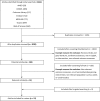Do video game interventions improve motor outcomes in children with developmental coordination disorder? A systematic review using the ICF framework
- PMID: 30651097
- PMCID: PMC6335818
- DOI: 10.1186/s12887-018-1381-7
Do video game interventions improve motor outcomes in children with developmental coordination disorder? A systematic review using the ICF framework
Abstract
Background: Children with developmental coordination disorder (DCD) experience a range of difficulties that can potentially limit their academic, social and physical ability. Recent research has developed interventions that aim to improve motor outcomes in a variety of paediatric cohorts using video gaming equipment. Therefore, we aimed to systematically review the literature on virtual reality or video game interventions that aim to improve motor outcomes in children with DCD.
Methods: Seven databases were searched for studies using the following criteria: a) virtual reality or video game based intervention; b) children with DCD; and c) motor outcomes relating to body structure and function, activity or participation. Data were extracted relating to study design, participant characteristics, details of the intervention, outcome measures, results, and feasibility/adherence.
Results: Fifteen articles were included for review, including eight randomised controlled trials. No studies used virtual reality equipment, with all interventions using video games (Nintendo Wii in 12/15 articles). Mixed effects of video game intervention on outcome were found, with conflicting evidence across studies. Studies that reported on feasibility found most children enjoyed and adhered to the video game interventions.
Conclusions: This review found limited evidence for the effectiveness of video game interventions for children with DCD to improve motor outcomes due to limitations in the research including low sample sizes and low to moderate methodological quality. Further research is needed to determine the effect of video game or virtual reality interventions on motor outcomes in children with DCD.
Protocol registration: The protocol for this systematic review can be found on PROSPERO ( CRD42017064427 ).
Keywords: Developmental delay; Motor impairment; Physiotherapy; Video games; Virtual reality.
Conflict of interest statement
Ethics approval and consent to participate
Not applicable.
Consent for publication
Not applicable.
Competing interests
The authors declare that they have no competing interests.
Publisher’s Note
Springer Nature remains neutral with regard to jurisdictional claims in published maps and institutional affiliations.
References
-
- Blank R, Smits-Engelsman B, Polatajko H, Wilson P. European academy for childhood disability (EACD): recommendations on the definition, diagnosis and intervention of developmental coordination disorder (long version) Dev Med Child Neurol. 2012;54(1):54–93. doi: 10.1111/j.1469-8749.2011.04171.x. - DOI - PubMed
-
- American Psychiatric Association . Diagnostic and statistical manual of mental disorders. 5. Washington: American Psychiatric Association; 2013.
-
- Zwicker JG, Suto M, Harris SR, Vlasakova N, Missiuna C. Developmental coordination disorder is more than a motor problem: children describe the impact of daily struggles on their quality of life. Br J Occup Ther. 2018;81(2):65–73. doi: 10.1177/0308022617735046. - DOI
Publication types
MeSH terms
LinkOut - more resources
Full Text Sources
Medical


